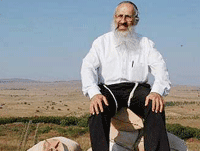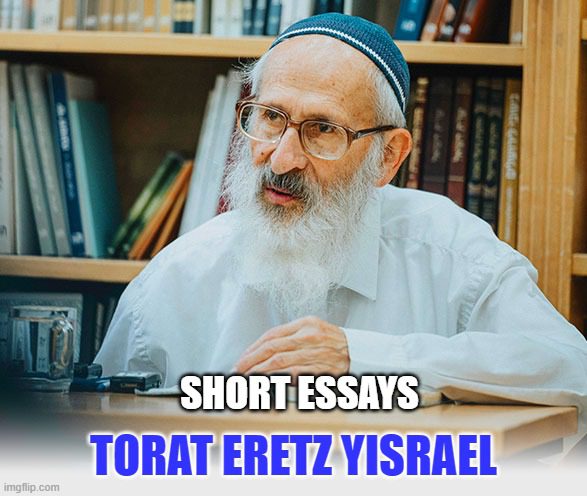Lech Lecha
Part One
HaRav Shlomo Aviner, Head of Yeshivat Ateret Yerushalayim

1. “Look at the Rock From Which You Were Hewn”
The central theme of the section Lech-Lecha is Avraham Avinu. There is an exceptional prophetic directive to scrutinize his personality: “Look at the rock from which you were hewn and at the quarry from which you were dug. Look to your father Avraham and to Sarah who gave birth to you.”[63] “Look” – examine and analyze! We must learn about both Avraham and Sarah, because they are “the rock from which we were hewn” and “the quarry from which we were dug.” They are our source and we were created from them.
- Our Spiritual Heritage From Our Forefathers
- Avraham and Us
When we examine Avraham, we learn about ourselves. We have to know who we are, what we are and what our spiritual makeup is. This can be learned from a close scrutiny of our forefathers. The Torah has no intention of simply telling us interesting, historical stories about Avraham and his deeds. The stories of Avraham give us an insight into our inner reality. It informs us who we are.
- The Deeds of the Forefathers Are an Indication of How Their Descendants Will Behave
The well-known principle, “that what befell the forefathers is a sign of what will occur to their sons,” was formulated by the Ramban.[64] This similarity of event between fathers and sons is not incidental, but stems from an inherent identity because the fathers and the sons are in fact one continuous chain and one single reality. The very character of the sons is contained in the fathers. There is a real spiritual continuity and heredity between the fathers and the sons. Their deeds are the same because their inner makeup is identical. It is quite possible that at a given time this identity will not manifest itself but deep down it is there and will eventually become apparent.
- “Who Visits[65] the Sins of the Fathers Upon the Children”
The conformity between the fathers and sons also exists in the negative sense. This is expressed in the verse, “[G-d] visits the iniquities of the fathers upon the sons even to the third and fourth generations”[66] and “The parents have eaten sour grapes but their children’s teeth are set on edge.”[67] One instinctively asks, “Is it fair that fathers sin and the sons are punished?” Our Sages explain this idea in the following fable composed by Rabbi Meir (It is said that when Rabbi Meir died the composers of fables ceased,[68] because he was the storyteller par excellence and had three hundred parables on foxes alone). On one occasion a fox enticed a wolf to help the Jews prepare food for Shabbat. When he arrived, however, the Jews took sticks and beat him. Angrily the wolf caught the fox with the intention of devouring it. The fox claimed that it was not his fault, they have a grudge against his father who once helped them prepare but then ate all of the good food. The indignant wolf replied, “Was I beaten for my father’s misbehavior?” “Yes,” replied the fox, “the fathers ate sour grapes and the children’s teeth are set on edge.”[69] The fox then cunningly saved its skin by saying, “If you free me, I will show you where you can get tasty, choice cheese to eat.” He led him to a well on which two buckets were hanging, attached to the two ends of a rope. The fox got in to the upper bucket and descended into the well while the lower bucket was drawn up. The fox pointing at the cheese-like reflection of the moon said to the wolf, “Come on down, there is plenty of food here.” The wolf entered the second bucket and descended, while the fox in the second bucket was drawn up. The wolf complained, “How do I get out of here?” The fox replied with a verse, “the righteous is delivered out of trouble and the wicked comes in his stead.”[70]
It is true that the sons are not punished indefinitely but only up to the third and fourth generation as the above-quoted verse says.[71] But what is the justice and logic even in this equation? It is reasonably understandable if the “sons continue in the [wicked] ways of the fathers,”[72] but what if they do not? A little deeper insight can explain why even when the sons do not sin they are still punished for their father’s sins. It can be compared to a pregnant mother who seriously neglects her health. The child born will almost inevitably suffer from some impairment. What is this baby to blame? He is not to blame; but he is still suffering for the “sins” of the mother. Another analogy could be that of parents with bad character traits which the children, despite their innocence, acquire because of the environment in which they were raised.
Let’s delve a little deeper. Every person inherits a parental heritage for good and for bad. If a person were to complain that it is not fair for him to suffer for his parents wrongs, the simple answer would be that he also enjoys the benefits of the positive heritage. The positive heritage is far more effective and long term than the negative legacy. This is testified to by the verse, “who visits the iniquities of the fathers upon the sons to the third and fourth generation,” whereas concerning those who love G-d, it states, “I show love for thousands of generations.”[73] We complain about punishment because of our parents but forget to appreciate all of the good we have received through them. Let us conjure up how the world looked several thousand years ago when man was still climbing trees. The world today is unrecognizably different – culturally, spiritually and technologically – because of all of the educational effort that was invested over that period. This did not occur overnight but as the result of development over the generations. We benefit from the sum total of human progress in all of these areas and in particular from the direct influence of our fathers. But we also suffer from the mistakes that they made. Is this unfair? Together with the diversified and rich gift which we have received from former generations we have also received an incomparably smaller injurious inheritance. No person can construe himself as a lone creature unrelated to the human race. All of the generations are one continuous chain which together make up one soul, the Divine vitality which is gradually unfolding for better or for worse, over the course of history.
- Israel Is Clearly Descended From Avraham
The character traits of our forefathers are deeply rooted in our own psyche. Maran (our revered teacher) Ha-Rav Avraham Yitzchak Ha-Cohain Kook, in his commentary to the Akeidah,[74] explains that the self-sacrifice which Avraham manifested implanted the strength to show unconditional self-sacrifices for G-d. We are a Nation replete with self-sacrifice. Avraham Avinu was willing to sacrifice not only his beloved and only son but even all future generation of the entire Jewish Nation, even though Hashem had promised, “and I will make you a mighty Nation.”[75] While there is a willingness to sacrifice one’s physical life, Avraham Avinu was even prepared to forgo his spiritual life viz. the spreading in the world of all of his ideals by his progeny. This supreme trait has been ingrained in us, all of his offspring, by his deed.
Avraham is also a great man of faith as it says, “and he believed in G-d.”[76] We also inherited this characteristic. We are a Nation of believers in G-d. When Moshe Rabbenu, on being sent to lead the redemption from Egyptian slavery, said to G-d, “they will not believe me,”[77] he was admonished by Hashem. He was told that they would believe him since they are believing sons, who have inherited this characteristic from their believing fathers.
- A Nation of Believers
Faith is an inherent part of our national character despite the fact that there are Jews who do not “actively” believe. In a well-known saying, Maran Ha-Rav Kook has revealed to us a deep truth about the Jewish soul. He said: “The greatest atheist among the Jews has more faith than the greatest believer among the non-Jews.”[78] This seems a strange statement as we see that there are many non-believing Jews. The real meaning is that in the very depth of their soul they believe since they possess the characteristic of the Nation to which they belong. This, however, has yet to surface to a conscious level in these individuals. This can be compared to an expert musician who states that a certain child is a musical genius, even though the child cannot even play the flute. The explanation is that the musician is describing the inner talent of the child which may not be evident since he may be too lazy to practice. We must find a way to encourage him to hone his talent.[79] The fact that the talent is not apparent does not mean that it does not exist. On the other hand, not everyone can be a musician. It is a talent from birth. If a person is not born with it, all the lessons in the world will not help to develop what is not there.
This is the case with us. Ingrained within our very essence is the talent and predisposition for faith, even if not every Jew “actively” believes. Some non-Jews may also have faith, but intense and deep faith as a national quality only exists within Israel.






